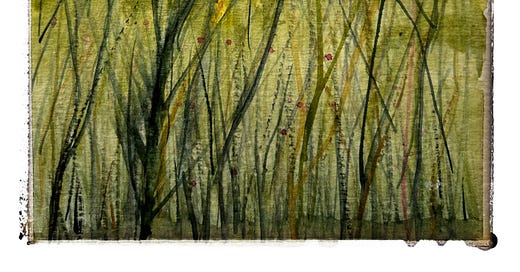From the Biophilia Playbook: We will never fully understand our connectivity with nature, but it is in this unknowing that we can progress our biophilic and nature positive journeys. It is in asking questions, many raised in this playbook, that we can relish in unknowing, and in celebrating the biophilia journeys we are taking, symbiotically as part of nature.
Many of the questions we ask around climate and ecology may have technical solutions. Biophilia and biophilic design solutions however are not plug and play. We cannot simply apply frameworks, standards, examples from elsewhere. There is the need for changing mindsets, of ourselves as humans, our organisations and our projects, exploring the place, the culture, the ecology in pursuit of both asking better questions and arriving at better solutions.
In editing and writing the Biophilia Playbook with the LFE Locus team, I wanted to conclude in the final chapter with perhaps a more philosophical approach to biophilic and regenerative practices, one that centres on humility and wonder rather than certainty and control.
Not only in placing the question what does unknowing mean in our minds, but in how unknowing could be productive for our regenerative and biophilia work, to encourage questioning to resurface our curiosity. Instead of assuming we have all the answers about how to use nature for our own health and wellbeing, embracing our ‘ignorance’ could open us to real learning and discovery. As the Regenerative Playbook emphasises, by asking questions rather than making assumptions, we work and live from a state of wonder and openness.
Yet, such unknowing isn't about lacking information, but rather about releasing the compulsive need to categorise, control, and intellectually dominate our experience of the world. It's a wisdom found in stepping back from the analytical mind, (see McGilchrists left brain Emissary) and the constant effort to make sense of everything, allowing instead for a more receptive feeling and open awareness.
‘Unknowing is not failure, but the condition of wisdom, deep emotional, cognitive, and institutional maturity’ Indy Johar
Instead of standing apart from nature as observers trying to study it, only asking what does nature connection ‘look like’, we can break down boundaries and recognise ourselves within the same living intelligence that we sense through forests, rivers, and ecosystems.
Being in the flow through this unknowing means re-discovering, remembering and feeling the flow of the rhythms and intelligence of living systems, allowing ourselves to be moved by the same forces that guides bird migration, seasonal cycles, the wheel of the year markers and in healing the future.
It's about being, a presence where our actions arise from interconnectedness, rather than agenda. In this sense, unknowing shouldnt be seen as a weakness but a starting point that allows us to progress in our regenerative practices and nature-positive initiatives. It is the Seva on the Ego - Eco - Seva journey. The embodied feeling of being part of and in service nature.
To “relish in unknowing” is a hint to finding joy in not having all the answers, treating uncertainty as an opportunity rather than a problem. Here is the positive futurism we so desperately need. We should be finding joy and positivity in the future we seek, and sharing that feeling through design, work, writing, and life. Less doom and gloom, more bloom and boom.
It is when the capacity of a place to sustain itself becomes ruptured that the human mind is forced to reflect upon ecology. Only then do most of us consider the interconnections between plants and animals and their environment. Ecology teaches that you cannot damage one part of a system without causing knock-on effects elsewhere. Soul and Soil, Alastair McIntosh
Regen Notes are postcards … from where I am, how I am , what is running in my mind, and what I am doing in the regenerative space …
Background
- From Doom and Gloom to Bloom and Boom - Ego, Eco, Seva update and viewed through the lens of Satish Kumar and Robin Wall Kimmer - Access Regenerative and Biophilia Playbooks
… from Doom + Gloom to Bloom + Boom
Why, as sustainability, biophilic or regenerative practitioners do we think the best route to encourage ‘climate’ action is through shock of climate, biodiversity or social collapse, a drip feed of doom and gloom. We are better than this, we have better stories to share.
Yes, we need to be aware of the dire consequences of doing nothing, but positive action can deliver bloom and boom - where “bloom” shares a future that is blossoming and thriving, and “boom” suggests explosive growth, success and vibrant energy. It’s a nice way to flip the pessimistic “doom and gloom” into something optimistic and forward looking. Positive Futurism as Rob Hopkins in How to Fall in Love with the Future wonderfully expresses it.
... on Ego-Eco-Seva
Seva comes from the Sanskrit root meaning “to serve” and represents selfless service performed without expectation of reward or recognition. Read more on the Ego-Eco-Seva background here
Through the lens of Robin Wall Kimmerer Ego: The “taking” mindset that sees nature as a commodity Eco: Understanding reciprocity and kinship with all beings Seva: The “giving back” that completes the cycle of reciprocity
Through the lens of Satish Kumar Ego: the worldview where we see ourselves as separate from nature and others. Eco: Understanding that “we are all members of one Earth community” Seva: the natural flowering of ecological consciousness into active service
“I transform my ego into eco. With just the change of one letter, I have transformed my worldview.” Satish Kumar
Regenerative Playbook
If you’d like a hard copy, or to order multiple copies for company libraries and reception areas or events as many have done, please get in touch and we can quote you - and we are only looking to cover printing, postage and admin costs.
Biophilia Playbook
Access from Living Future Europe here
Thank you for your paid subscription.



